Camper FAQs is reader-supported. Buying through links on our site may earn us an affiliate commission. As an Amazon Associate I earn from qualifying purchases.
Dry camping, also known as boondocking, is peak RV camping. You’re off-grid, away from the bustle and noise of city life. However, you can still enjoy a warm, comfortable bed and electricity.
Of course, the electricity to power these comforts of home doesn’t come out of thin air (actually, you can pull electricity out of the air, but not for our purpose). Instead, you’ll need a good boondocking battery system.
A few criteria will determine the best RV battery for boondocking, and what’s perfect for you may not be suitable for someone else.
So, let’s look at those criteria in detail, review 3 of the best RV batteries for boondocking, and help you find the best battery setup for your needs.
Best RV Batteries for Boondocking
Since you’re reading this to find out what the best RV battery for dry camping is, we’ll cut right to the chase and offer you what, in our opinion, are three of the best batteries you can use.
We broke these three batteries out by type, but keep in mind each type of battery has its pros and cons, depending on how long you typically boondock, your budget, etc.
So, let’s check out the top RV batteries for dry camping, and then we’ll get into the different types of batteries to find which is perfect for you!
*Buying through links in this chart may earn us a commission at no additional cost to you.
Battle Born LiFePO4 Deep Cycle Lithium-Ion Battery
- Best Lithium Battery for RV
If you’re a serious boondocker, then a lithium-ion battery is by far and wide the best choice. And the Battle Born LifePO4 is one of the best lithium-ion batteries on the market today!
Battle Born’s deep-cycle lithium-ion batteries, unlike Lead Acid batteries, have unlimited mounting capability and excellent longevity. While they have a higher upfront cost, they may be more cost-effective in the long run.
Battle Born batteries also feature BMS (Battery Management System) technology, which essentially protects the battery from common causes of failure – temperature volatility, ground faults, etc.
Plus, their batteries are made from 100% safe, non-toxic, renewable energy. They are designed to last for more cycles and to be quickly recharged and discharged faster (and more often) than other batteries on the market.
And you’ll notice they only weigh 31 pounds each! That is about half the weight of some other RV battery models.
Specifications
Brand: Battle Born Batteries
Voltage: 12 volts
Amp Hours: 100
Battery Cell Composition: Lithium-Ion
Item Weight: 31 pounds
Item Dimensions LxWxH: 12.75 x 6.88 x 9 inches
Warranty: 10-years

Battle Born LiFePO4 Deep Cycle Lithium-Ion Battery
Price:Clicking this link to make a purchase may earn us a commission at no additional cost to you.
VMAX XTR6-235 6 Volt 235Ah Group GC2 AGM Deep Cycle RV Battery
- Best AGM Battery
The XTR6-235 deep-cycle battery from VMAX USA is another excellent option to power your RV while dry camping.
These are 6-volt batteries, which typically last longer than your average 12-volt batteries and have a lower upfront cost than lithium-ion batteries. You can wire these in series to get 12 volts and in parallel to double the amp hours!
These AGM (absorbent glass mat) batteries feature a long 10-12 year float service life.
Plus, they are mostly maintenance-free, meaning you won’t have to add water or check electrolyte gravity.
The only downside is that they are on the heavy side at 78 pounds each, which might not be an issue unless you have a large battery bank.
Specifications
Brand: VMAX USA
Voltage: 6 volts
Amp Hours: 235
Battery Cell Composition: AGM
Item Weight: 78 pounds
Item Dimensions LxWxH: 10.2 x 7.1 x 10.8 inches
Warranty: First 12 months is a free replacement, then the percentage covered goes down after that.

VMAX XTR6-235 6 Volt 235Ah AGM Deep Cycle RV Battery
Price:Clicking this link to make a purchase may earn us a commission at no additional cost to you.
Optima OPT8016-103 BlueTop Starting and Deep Cycle Marine Battery
- Best Lead-Acid Battery
The Optima OPT8016-103 is a 12-volt, lead-acid battery designed for RV and marine use.
Optima batteries feature a unique SpiralCell design that provides clean and reliable power that is vibration resistant.
You won’t have to worry about mounting issues as these batteries can be mounted in virtually any position.
And, while I haven’t put it to the test, Optima claims these batteries offer up to 3 times more charges than other marine batteries.
Blue-top Optima batteries come with a 2-year free replacement warranty.
Specifications
Brand: Optima
Voltage: 12 volts
Amp Hours: 55
Battery Cell Composition: Lead-acid
Item Weight: 43.5 pounds
Item Dimensions LxWxH: 10 x 6.88 x 7.8 inches
Warranty: 24 months free replacement for non-commercial use

Optima OPT8016-103 BlueTop Deep Cycle Battery
Price:Clicking this link to make a purchase may earn us a commission at no additional cost to you.
Important: These three specific batteries are all excellent choices based on our experiences, customer reviews, and feedback from fellow campers. But they are by no means your only options. Once you know the best type of battery for your camping style, you can find one from a reputable manufacturer that perhaps better aligns with your budget. Just be sure to do your homework and read reviews before purchasing.
Types of RV Batteries
When it comes to batteries for your RV, you’ll find three main types dominating the market.
Lithium-Ion Batteries
Lithium batteries are the newest type of battery available for RVs.
They have quickly replaced the other battery types as the preferred battery for a variety of reasons, including:
- They are about half the weight of other battery types, which is important when RV’ing.
- They pair well with solar panels, which is excellent if you’re one to boondock for extended periods of time. Check out our guide on how to hook up solar panels to RV batteries for complete step-by-step instructions.
- Because of their LiFePO4 technology, Lithium RV batteries are extremely safe and virtually maintenance-free.
- They are more powerful than the other battery types, store energy longer, and you can discharge them up to 80%.
While these batteries seem too good to be true, they have one downside: cost.
Lithium-ion batteries have a much higher upfront cost than the other types of batteries. With that said, in the long run, they may be worth it as they last longer, provide more power, and make your life easier while boondocking.

Battle Born LiFePO4 Deep Cycle Lithium-Ion Battery
Price:Clicking this link to make a purchase may earn us a commission at no additional cost to you.
Lead-Acid Deep Cycle RV Batteries
On the other side of the spectrum, we have lead-acid batteries.
These are the most common battery types for RVs and generally come with a new recreational vehicle purchase.
Lead-acid batteries contain plates immersed in an electrolyte solution of sulfuric acid and water.
You can find these deep-cycle batteries in both 6-volt and 12-volt versions.
Lead-acid batteries are the most inexpensive of the three battery types. They are an excellent option for weekend campers and those who don’t mind running a generator multiple times a day.
They do come with some downsides, however, including:
- They require consistent watering to keep the plates submerged.
- They should only be discharged to about 50%, otherwise irreversible damage can occur.
- They are heavier than their Lithium-ion counterparts.

Optima OPT8016-103 BlueTop Deep Cycle Battery
Price:Clicking this link to make a purchase may earn us a commission at no additional cost to you.
AGM Batteries
Like flooded lead-acid batteries above, AGM (absorbent glass mat) batteries are sealed lead-acid batteries that use glass fibers in a mat rather than lead plates.
AGM batteries do, however, offer a few advantages over their flooded lead-acid counterparts:
- You can discharge a higher percentage of the battery (with some models, and a deeper discharge will negatively affect the long-term life).
- They don’t require the same level of maintenance.
The downside compared to lead-acid batteries would be a higher price point, which some may not think it’s worth it for the relatively small advantage AGM batteries have.

VMAX XTR6-235 6 Volt 235Ah AGM Deep Cycle RV Battery
Price:Clicking this link to make a purchase may earn us a commission at no additional cost to you.
Other Important RV Battery Terms
Along with the different types of RV batteries, there are a couple of additional terms you should familiarize yourself with (if you haven’t already).
Voltage
In motorhomes, 5th wheels, camper trailers, and other types of recreational vehicles, you’ll typically find either a 6-volt battery bank or a 12-volt battery.
6-Volt RV Battery vs. 12-Volt RV battery
Your recreational vehicle’s DC runs on 12 volts, making 12-volt batteries the most straightforward approach if you plan to upgrade your battery system for boondocking.
As mentioned above, 6V batteries are typically cheaper, but you’ll need multiple batteries for sufficient power, they take up more space, and they’ll add additional weight.
There are also 24-volt batteries. They can be a great space-saving option, but you’ll need to install a step-down converter.
Amp Hours
Amp-hours (typically abbreviated to Ah) are what the electrical devices in your RV consume when in use.
You’ll notice most RV batteries fall between 55 and 235 Ah. As a boondocker, it’s important to figure out how much electricity you’ll need to make the best decision regarding your battery bank’s Ah capacity (which we detail below).
What Size Battery Do I Need for Boondocking?
100 amp-hours (ah) of battery capacity should easily power your RV for a day of boondocking if you’re using basic electrical devices and appliances. You can add additional batteries to your bank for an even longer-lasting power supply. And when needed, flip on your generator when you need a recharge or let solar power handle the charging.
Related: How to Charge RV Batteries
I like to keep things simple. But we can use a little math for RV owners who want a more specific answer.
To calculate the battery size you will need for boondocking, you will first need to calculate your power needs.
Start by writing down the devices you plan on using daily and how long you will use each one. Then check the device for the number of amps they consume. If you can only find the watts for a specific device, then simply convert it to amps.
Amps = watts/volts
Then, to convert from 120-volt AC to 12-volt DC power, multiply amps by 10. If your appliance or device is 12v, you can skip this step.
It’s much easier to understand if we look at an example:
A coffee pot uses 200W on 120-volt AC. So, take 200 / 120 = 1.67 amps. This means that when on 120-volt AC power, the coffee pot uses 1.67 amps per hour. Since you’ll be running everything from a 12-volt DC source (your RV batteries) while boondocking, you’ll need to convert the amps to 12-volt by multiplying by 10. So, we’ll take 1.67*10=16.7 amps per hour. If you use your coffee pot for 1 hour per day, you will need 16.7 Ah for just your coffee pot.
Now, perform this with all of the devices you plan to use while boondocking (lights, phone charger, laptop, etc.) to get a good estimate of the total amp-hours you will use and the size of the RV house battery (or batteries) you will need. Just keep in mind that if using a lead-acid battery, you can only use about 50% of it before recharging it.
You can learn more with our guide titled How Long Will an RV Battery Last Boondocking? for more information and some effective energy-saving tips!
Quick Tip: To save battery life, use an RV generator when using high amp appliances and switch your refrigerator to propane when possible. Swapping out regular lights for LED lights and charging your phone, computer, and smaller electrical-powered devices with a solar charger can help preserve your batteries while boondocking, as well.



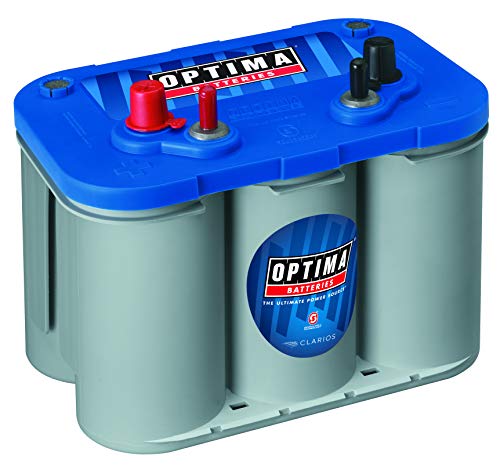
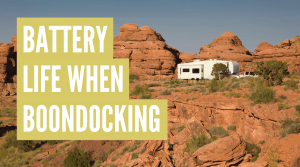
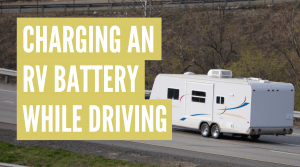


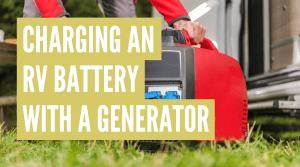
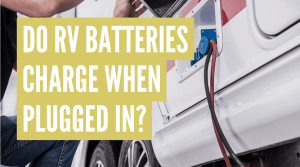
Can you connect a lead acid battery and a Lytham battery together
While technically possible with the right setup, its generally not recommended due to safety issues.